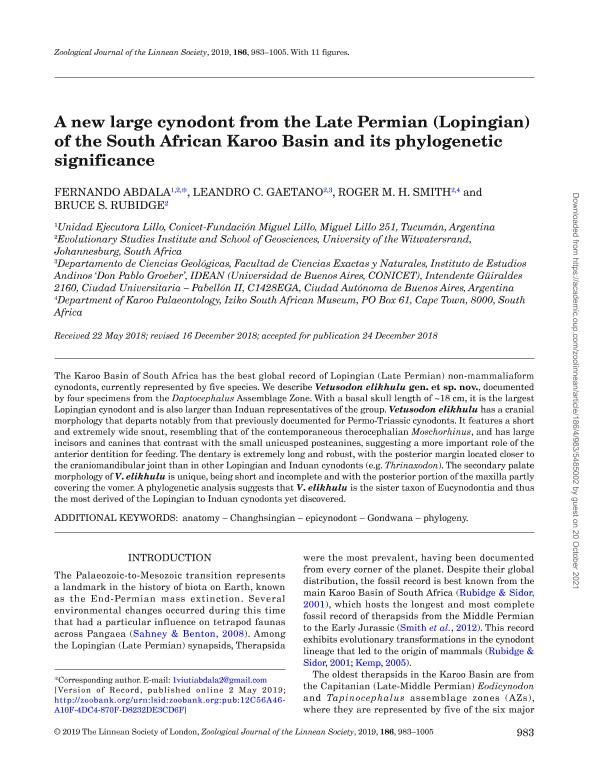Mostrar el registro sencillo del ítem
dc.contributor.author
Abdala, Nestor Fernando

dc.contributor.author
Gaetano, Leandro Carlos

dc.contributor.author
Smith, Roger M. H.

dc.contributor.author
Rubidge, Bruce

dc.date.available
2021-10-20T14:22:21Z
dc.date.issued
2019-08
dc.identifier.citation
Abdala, Nestor Fernando; Gaetano, Leandro Carlos; Smith, Roger M. H.; Rubidge, Bruce; A new large cynodont from the Late Permian (Lopingian) of the South African Karoo Basin and its phylogenetic significance; Wiley Blackwell Publishing, Inc; Zoological Journal of the Linnean Society; 8-2019
dc.identifier.issn
0024-4082
dc.identifier.uri
http://hdl.handle.net/11336/144434
dc.description.abstract
The Karoo Basin of South Africa has the best global record of Lopingian (Late Permian) non-mammaliaform cynodonts, currently represented by five species. We describe Vetusodon elikhulu gen. et sp. nov., documented by four specimens from the Daptocephalus Assemblage Zone. With a basal skull length of ~18 cm, it is the largest Lopingian cynodont and is also larger than Induan representatives of the group. Vetusodon elikhulu has a cranial morphology that departs notably from that previously documented for Permo-Triassic cynodonts. It features a short and extremely wide snout, resembling that of the contemporaneous therocephalian Moschorhinus, and has large incisors and canines that contrast with the small unicusped postcanines, suggesting a more important role of the anterior dentition for feeding. The dentary is extremely long and robust, with the posterior margin located closer to the craniomandibular joint than in other Lopingian and Induan cynodonts (e.g. Thrinaxodon). The secondary palate morphology of V. elikhulu is unique, being short and incomplete and with the posterior portion of the maxilla partly covering the vomer. A phylogenetic analysis suggests that V. elikhulu is the sister taxon of Eucynodontia and thus the most derived of the Lopingian to Induan cynodonts yet discovered.
dc.format
application/pdf
dc.language.iso
eng
dc.publisher
Wiley Blackwell Publishing, Inc

dc.rights
info:eu-repo/semantics/openAccess
dc.rights.uri
https://creativecommons.org/licenses/by-nc-sa/2.5/ar/
dc.subject
ANATOMY
dc.subject
CHANGHSINGIAN
dc.subject
EPICYNODONT
dc.subject
GONDWANA
dc.subject
PHYLOGENY
dc.subject.classification
Paleontología

dc.subject.classification
Ciencias de la Tierra y relacionadas con el Medio Ambiente

dc.subject.classification
CIENCIAS NATURALES Y EXACTAS

dc.title
A new large cynodont from the Late Permian (Lopingian) of the South African Karoo Basin and its phylogenetic significance
dc.type
info:eu-repo/semantics/article
dc.type
info:ar-repo/semantics/artículo
dc.type
info:eu-repo/semantics/publishedVersion
dc.date.updated
2020-12-16T16:11:04Z
dc.journal.pais
Reino Unido

dc.description.fil
Fil: Abdala, Nestor Fernando. Consejo Nacional de Investigaciones Científicas y Técnicas. Centro Científico Tecnológico - Tucumán. Unidad Ejecutora Lillo; Argentina
dc.description.fil
Fil: Gaetano, Leandro Carlos. Universidad de Buenos Aires. Facultad de Ciencias Exactas y Naturales. Departamento de Geología; Argentina
dc.description.fil
Fil: Smith, Roger M. H.. Evolutionary Studies Institute; Sudáfrica
dc.description.fil
Fil: Rubidge, Bruce. Evolutionary Studies Institute; Sudáfrica
dc.journal.title
Zoological Journal of the Linnean Society

dc.relation.alternativeid
info:eu-repo/semantics/altIdentifier/url/https://academic.oup.com/zoolinnean/advance-article/doi/10.1093/zoolinnean/zlz004/5485002
dc.relation.alternativeid
info:eu-repo/semantics/altIdentifier/doi/http://dx.doi.org/10.1093/zoolinnean/zlz004
Archivos asociados
